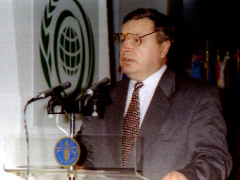


BELARUS | ||
His Excellency Vladzimir Garkun, Deputy Prime Minister of the Republic of Belarus | ||

The Government of the Republic of Belarus supports the main provision of the Rome Declaration and the Plan of Action. We cannot but agree that an ongoing process of globalization of the economy will make it possible to expand markets as well as goods and services and their flow to facilitate economic interrelationship and improve people's well-being. At the same time the elimination of trade and other economic barriers will increase the vulnerability of countries with a less developed economy. Many of them today are incapable of keeping pace with the process of change and finding their way out of the vicious circle of economic backwardness. The Republic of Belarus has started the process of its admission to the World Trade Organization (WTO). It is not an exaggeration to say that the norms of the WTO are in essence a sort of international trade law. We understand that any country being out of this general legal space and out of this organization will be doomed to be left marginalized from international trade. In this context the economies in transition, including the Republic of Belarus, can by right expect special treatment from the international community in order to assist in their integration into the world economic system. The agro-industrial complex historically occupied a very important place in the economy of Belarus. Belarus possesses good conditions for agricultural development. We have quite impressive land potential and favourable climatic conditions and a dynamic chemical fertilizer industry. However there are a lot of difficulties in the process of transition from tough regulations to open market relations. At the same time, the Republic of Belarus has committed itself to market reforms and the Government pursues market oriented changes bearing in mind that there is no other alternative. The forms of ownership, and land relationships, are changing. There are smaller private farms developing. The programme of privatization of state farms has been adopted and the private sector occupies a considerable place in the economy. The Republic of Belarus is open to foreign investment and has all the legal framework to ensure and protect this investment. We are interested in increasing foreign participation in the agricultural sector in Belarus taking into consideration our geopolitical location. After the collapse of the Soviet Union, country-wide food production suffered a fall in Belarus but the Republic has the economic and productive potential, and agriculture is our priority industry. The Government has strongly committed itself to reorganize this sector into a dynamic and effective sector in the national economy in order to participate in the integration process. I cannot but mention an incident which forced us and the whole world to re-evaluate a lot of traditional approaches including the concept of food security. In this year, mankind marked the sad tenth anniversary of the largest disaster of the twentieth century and I refer to Chernobyl. Belarus has had to bear the main brunt almost all by itself of eliminating the consequences of the Chernobyl disaster. The nature of this disaster determined an unprecedented scope of radioactive contamination in the whole territory of Belarus. Direct losses from the reduction in the harvested area in the period 1986 to 2015 are estimated to amount to US$ 15.2 billion; and aggregate damage will be about US$ 70 billion. As you can understand, it is a considerable sum of money for us. Under the conditions of wide radioactive pollution, the Republic of Belarus has had to learn how to manage its agricultural sector, to work out a whole series of complex protective measures, to carry on respecializing farms and to change crop rotation schemes. On behalf of the Government of the Republic of Belarus, I would like to address all the international organizations and funds dealing with problems of agricultural production and processing beginning with FAO, to request assistance for our young Government in overcoming the consequences of the Chernobyl disaster. Belarus actively participates in international cooperation on environmental protection. Notable among these is the Convention on Biological Diversity which Belarus signed in June 1992 and carries out its obligations. An International Conference on Sustainable Development of Economies in Transition will be held in Minsk this year. In recent years a new problem has arisen and this is one of refugees and voluntary displaced persons from the Commonwealth of Independent States (CIS) and other regions, as well as related to the need for creating employment and food security. From our point of view, the need to work out a unified programme regarding refugees and the use of food reserves in developed countries for this purpose is most important. Ladies and Gentlemen, I am confident that the Summit will provide us with an opportunity to exchange the experiences we all have and will inspire us in cooperating to ensure food security. The production potential for sufficient food supply exists and we have to increase it through the development of effective international trade relations. | ||
|
|
|
|

 |